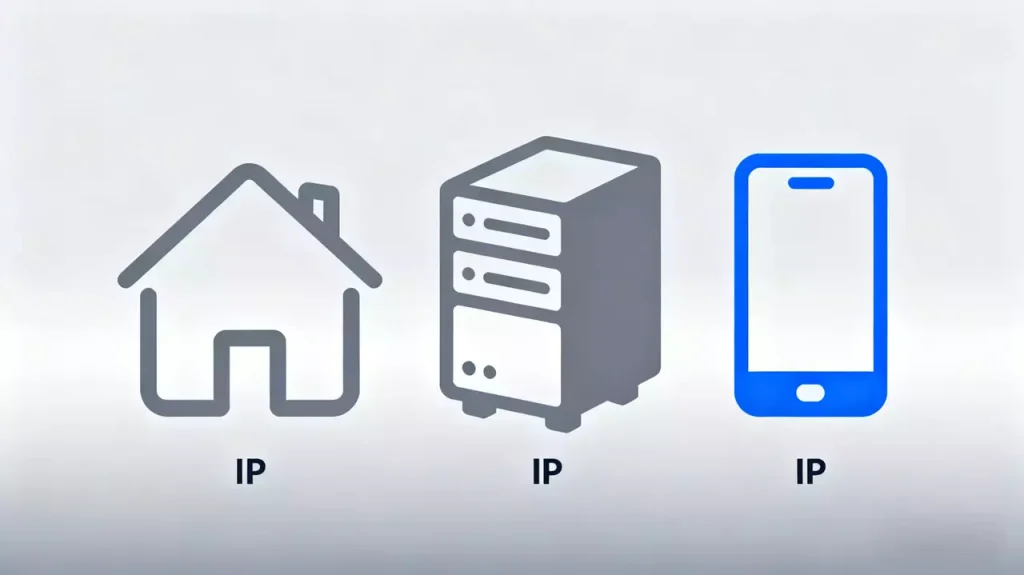Selecting the right proxy IP is crucial for cross-border e-commerce, data collection, and international operations. Different types of IPs vary in stability, authenticity, and suitability for specific use cases. This guide provides a professional overview of data center IPs, residential IPs, and mobile IPs, and explains how network proxies and optimized international connections can support your business.

Residential IPs: Features and Use Cases
Residential IPs are assigned to home users by ISPs and include static residential IPs and dedicated dynamic IPs. Key characteristics:
- Closer to real users: From the perspective of IP origin, residential IPs reduce the likelihood of being flagged by anti-fraud or risk detection systems.
- Suitable for core account management: Ideal for managing cross-border e-commerce stores or handling sensitive operations like international payments.
- Flexible options: Users can choose between fixed IPs and dedicated dynamic IPs depending on operational needs.
Note: Account correlation is determined by multiple factors—IP, browser fingerprint, device fingerprint, and behavior patterns. Using residential IPs alone cannot fully prevent account linkage.
Static Residential IP vs Dedicated Dynamic IP
| Type | Features | Recommended Use |
| Static Residential IP | Long-term fixed IP | Core accounts and long-term store operations |
| Dedicated Dynamic IP | Periodically rotated IP | Multi-account management, anti-linkage, or short-term tasks |
Residential IPs combined with optimized international routes or overseas network connections can help improve cross-border access reliability in most cases, though actual latency and packet loss may vary depending on global network conditions.
Data Center IPs: Overview and Risks
Data center IPs are provided by cloud providers or professional data centers, independent of home or mobile networks. Key traits:
- High speed and low latency: Suitable for large-scale access or automated data collection.
- Highly controllable: Convenient for running multiple browser instances or scheduled tasks.
- Large IP pools and relatively low cost.
Risk warning: Data center IPs are easily identifiable as proxies by major platforms and are not suitable for core accounts or sensitive operations.
Use Cases:
- Market research and data scraping (often paired with residential proxies or crawling tools)
- Cross-border ERP operations or large-scale testing
Mobile IPs: Features and Recommendations
Mobile IPs are dynamically assigned by mobile carriers from centralized IP pools. Characteristics:
- Highly dynamic: IP addresses change frequently.
- Geolocation is imprecise: IPs may be routed across regions depending on the carrier’s network management.
- Variable speed and stability: Depends on mobile network conditions.
Recommended Use:
- Manual access via mobile devices
- Temporary or short-term access
Caution: Mobile IPs should not be used for bulk automated operations or long-term core account activity, as this can trigger carrier security measures, resulting in blocked IPs or suspended SIMs.
How to Choose the Right Proxy IP
To select the most suitable IP type, consider business needs and account security:
- Core accounts, long-term operations, or sensitive tasks → Prioritize residential IPs (static or dedicated dynamic) for reduced risk from the IP dimension.
- Short-term testing or bulk access → Consider data center IPs.
- Temporary mobile access → Use mobile IPs, limited to manual tasks.
Combining network proxies with optimized international routes can improve cross-border access reliability in most scenarios. Platforms like IPhalo provide high-quality residential proxy IPs or IPs with clean usage history, supporting stable access to foreign websites.
Summary
- Residential IPs: Reduce IP-based account linkage risks, suitable for core accounts and sensitive operations, but should be combined with fingerprint and behavior management.
- Data Center IPs: Fast and cost-effective, suitable for short-term tests and large-scale scraping, but not ideal for core accounts.
- Mobile IPs: Highly dynamic, suitable for temporary mobile access, but geolocation is imprecise and automated tasks are discouraged.
A rational selection of proxy IPs, considering business requirements, security strategy, and network optimization, ensures efficient and safe cross-border operations.






